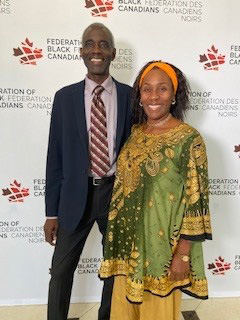Tribute Award for Leadership

By Patchen Barss
In 2020, during the height of pandemic isolation, Clovis and Sherron Grant launched a support group for Black parents of children with a disability. Sawubona Africentric Circle of Support has since helped empower, educate, and enlighten more than 250 families.
“We truly believe that these families have what it takes to provide a good life for their loved ones,” says Sherron Grant. “However, the isolation and marginalization they have felt accessing mainstream services have made them feel unimportant, sometimes angry and unsure how to best get their needs met. We provide a space where caregivers can take care of themselves, and through greater knowledge of the service systems and supports available, become more confident.”
As parents of a child with autism, the Grants experienced firsthand the distinct, interconnected factors that compound issues of isolation and frustration for Black caregivers.
“Anti-Black racism exists in Canada and within the disability sector,” says Clovis Grant, though he cautions against oversimplifying the effect of these structural issues. “Beware the ‘danger of a single story.’ Beyond race, ethnicity and disability are other factors that contribute to the marginalization of individuals and families including socioeconomics, language, and understanding Canadian systems.”
Members of the Sawubona support group find safety, acceptance, and understanding, as well as information on accessing services.
The group started online and has grown to include in-person and hybrid gatherings. Finding a community often contributes significantly to members’ self-esteem and overall well-being—fundamental factors at the core of the human experience. Through their work, the Grants demonstrate over and over again how, when Black caregivers are supported and cared for, they are better equipped, inspired, and empowered to help their family members thrive. Each success reminds them how much more work is still to be done. They continue to expand Sawubona’s reach, seeking to include families with English as a second language, newcomers, low-income earners, and others who face additional isolating factors.
“What started out as a desire to bring a few Black families dealing with disability together in our living room has grown into an organization doing more in such a short period of time than we ever imagined,” Sherron says.